(DailyMail) -North Korea was today warned it faced fresh sanctions if it went ahead with a predicted missile test in the escalating nuclear stand-off with its neighbours and their Western allies.
Following a meeting of the G8 nations in London, foreign ministers said they had committed themselves to ‘further significant measures’ if the test was carried out.
It came on another tense day on the Korean peninsula, where images of four female soldiers in heels and Soviet-style hats were released in the latest act of bravado from madman dictator Kim Jong Un.
They were accompanied by a fresh round of rhetoric by the pariah state which claims it had ‘powerful striking means’ on standby for a launch.
The official statement is the latest in a torrent of warlike threats seen outside Pyongyang as an effort to raise fears and pressure Seoul and Washington into changing their North Korea policy.
Scroll down for video
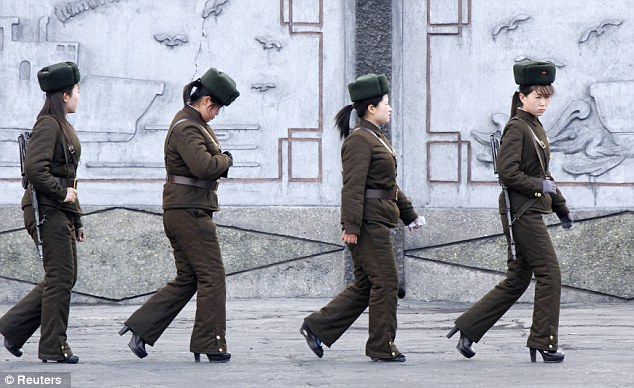 Femme fatales: Female North Korean soldiers patrol along the banks of Yalu River, near the town of Sinuiju, as the world remained on high alert for a North Korean missile launch
Femme fatales: Female North Korean soldiers patrol along the banks of Yalu River, near the town of Sinuiju, as the world remained on high alert for a North Korean missile launch
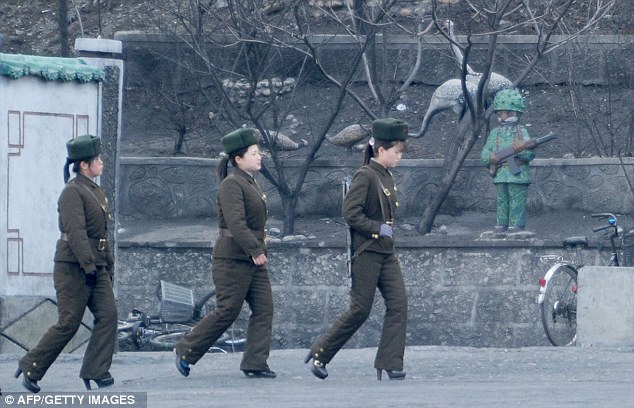 Frontline females: Women are believed to represent more than 10 per cent of the entire North Korean People’s Army, according to visitors to the state
Frontline females: Women are believed to represent more than 10 per cent of the entire North Korean People’s Army, according to visitors to the state
The eyes of the world remain focused on the secretive nation after South Korea warned that the prospect of a missile attack was ‘considerably high’
The U.S. is on standby to intercept any missile fired and warned North Korea it was ‘skating very close to a dangerous line’ after it emerged the communist state’s weapons system was ‘fuelled and ready to launch’.
More…
- ‘We’re ready’: American commander in the Pacific says he could knock out any North Korean missile strike as the rogue nation says it will launch one tomorrow
- ‘I murdered 115 people on orders of North Korea’: State’s top female spy reveals horrifying truth of serving communist dictatorship that brought down plane
In London, William Hague hosted counterparts from G8 nations including the U.S., Canada, France, Germany, Italy, Japan and Russia amid fears the escalating tensions could trigger a nuclear war.
But it was the image of a group of female soldiers patrolling along the Yalu River at the town of Sinuiju that triggered fresh interest today.
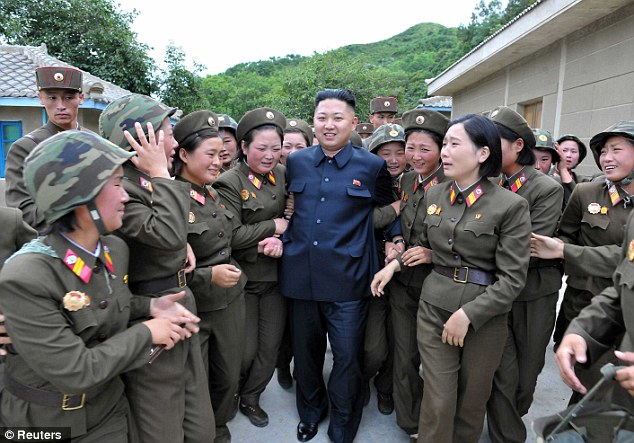 With the ladies: North Korean dictator Kim Jong Un with female members of the Korean People’s Army Unit 4302 in an undated picture. Many of the artillery units along the coasts are manned with women
With the ladies: North Korean dictator Kim Jong Un with female members of the Korean People’s Army Unit 4302 in an undated picture. Many of the artillery units along the coasts are manned with women
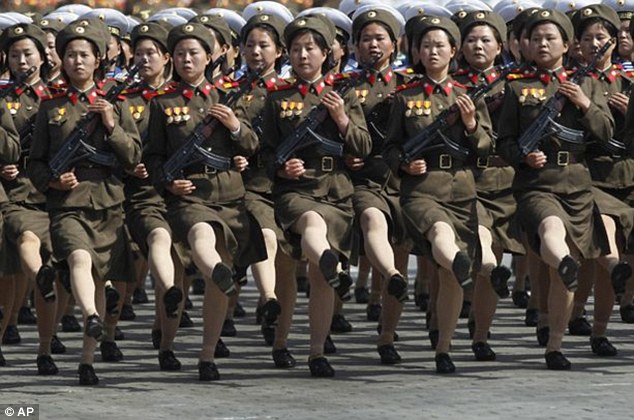 Goose-stepping girls: Propaganda songs have been written to attract more women into the coastal artillery units and women fighters now guard nearly all tunnels and bridges (file picture)
Goose-stepping girls: Propaganda songs have been written to attract more women into the coastal artillery units and women fighters now guard nearly all tunnels and bridges (file picture)
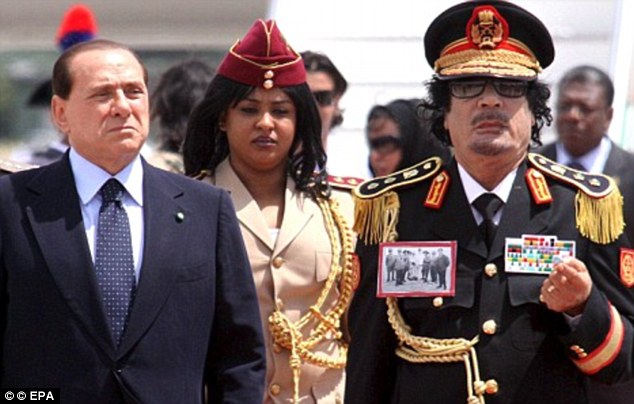 Trend-setter: The image of women in uniform sparked memories of Libyan dictator Muammar Gaddafi’s distinctive band of female bodyguards, who wore sunglasses and headdresses and knee-boots
Trend-setter: The image of women in uniform sparked memories of Libyan dictator Muammar Gaddafi’s distinctive band of female bodyguards, who wore sunglasses and headdresses and knee-boots
The town is the biggest border crossing between North Korea and China and has been closed to tourist groups, but business travel was still allowed.
The image of women in uniform sparked memories of Libyan dictator Muammar Gaddafi’s distinctive band of female bodyguards, who wore sunglasses and headdresses and knee-boots.
Women are believed to represent more than 10 per cent of the entire North Korean People’s Army, according to visitors to the state, with many of the artillery units along the coasts manned with women.
Propaganda songs have been written to attract more women into the coastal artillery units and women fighters now guard nearly all tunnels and bridges.
Kim Ok-Hee, 28, a former instructor at a training camp described in a 2007 interview how the state relies heavily on its female soldiers.
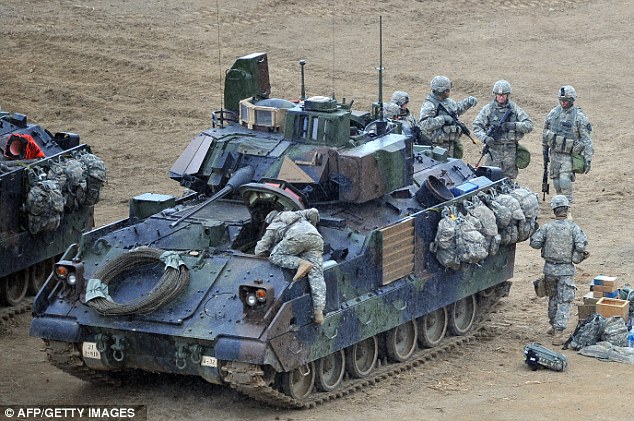 Final preparations: U.S. soldiers check their tank at a military training field near Seoul, South Korea as the Obama administration warned North Korea it is skating a ‘dangerous line’ with its proposed missile launch
Final preparations: U.S. soldiers check their tank at a military training field near Seoul, South Korea as the Obama administration warned North Korea it is skating a ‘dangerous line’ with its proposed missile launch
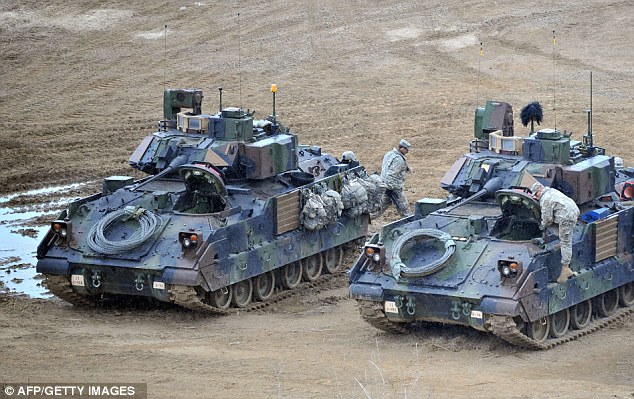 Tinkering with the tanks: The U.S. is preparing to intercept any missile after it emerged the communist state’s weapons system was ‘fuelled and ready to launch’
Tinkering with the tanks: The U.S. is preparing to intercept any missile after it emerged the communist state’s weapons system was ‘fuelled and ready to launch’
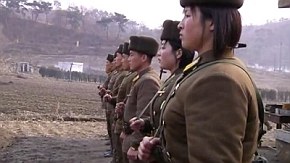
Kim served at the 4.25 boot camp, a mechanised division whose mission is to guard the coasts of South and North Pyongan Provinces against the infiltration by enemy paratroopers during a crisis.
The boot camp had five regiments and each regiment had a women infantry battalion consisting of tanks and artilleries, she said.
But even in North Korea’s supposedly egalitarian society, women with good looks or family influence are deployed at more desirable postings, such as medical units, while others end up in artillery units, she said.
Choi Young-Il, 38, who served as a maintenance mechanic in the North Korean air force, said in the same interview that women began to be deployed in his units around 1998.
‘In my unit, all the pilots for IL-28 bombers were women and many women were pilots for the AN-2, which Kim Jong-Il boasted as a more deadly weapon than nuclear bombs,’ Choi said.
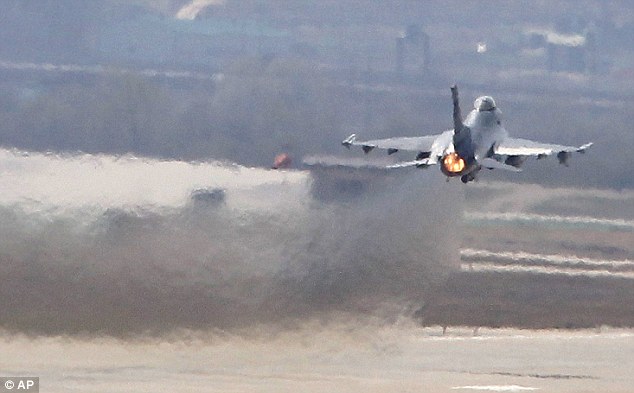 Staying sharp: A U.S. Air Force F-16 fighter jet takes off from a runway during a military exercise at the Osan U.S. Air Base in Osan, South Korea
Staying sharp: A U.S. Air Force F-16 fighter jet takes off from a runway during a military exercise at the Osan U.S. Air Base in Osan, South Korea
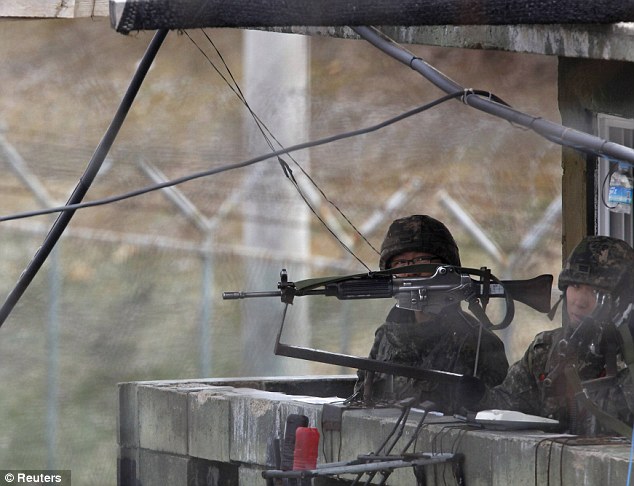 Weapons ar the ready: South Korean soldiers stand guard at an observation post near the demilitarised zone which separates the two Koreas in Paju, north of Seoul
Weapons ar the ready: South Korean soldiers stand guard at an observation post near the demilitarised zone which separates the two Koreas in Paju, north of Seoul
Meanwhile, one cyber expert warned today that it may be the escalating battles between the two Koreas over the internet that triggers full-scale warfare in the real world.
Jarno Limnell, doctor in military science and director of cyber-security for Stonesoft, based in Finland, said a ‘cyber war arms race’ is now in operation on the peninsula.
He told The Huffington Post: ‘Actions in the cyber world easily escalate to warfare or threats of war as the situation on the Korean peninsula demonstrates.’
He spoke out after South Korea yesterday accused the North of orchestrating a cyber attack that shut down about 32,000 computers and servers at South Korean broadcasters and banks.
And with hacking group Anonymous now targeting Kim Jong Un’s regime and increasingly powerful cyber weapons emerging, Limnell warned the worst is yet to come.
He said: ‘The side effects and results of actions in the cyber world are difficult to estimate and manage, which makes them even more dangerous.
‘Cyber activities play a significant role in the rapidly escalating chain of events – which, in the worst case, may lead to large-scale warfare.’
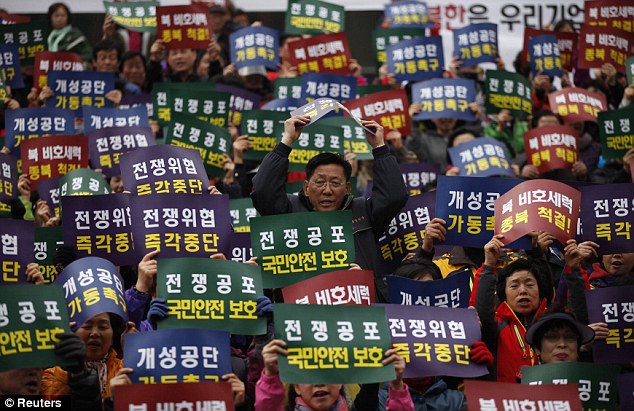 Unrest: Members of the Korea Freedom Federation chant slogans during a rally for North Korea to re-start operations at the joint Kaesong Industrial Complex as the country remained on high alert
Unrest: Members of the Korea Freedom Federation chant slogans during a rally for North Korea to re-start operations at the joint Kaesong Industrial Complex as the country remained on high alert
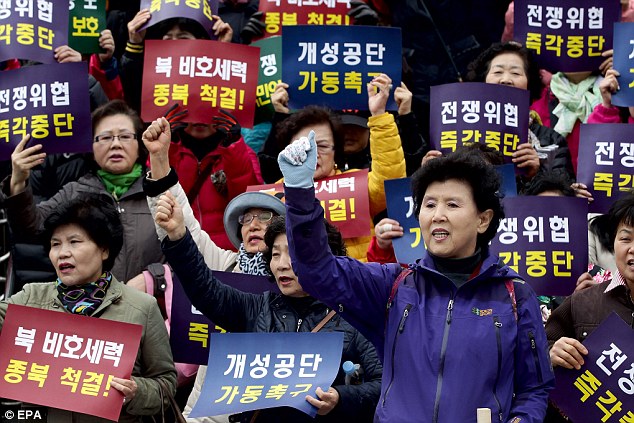 Crisis: Members of the Korea Freedom Federation were also protesting against North Korea’s warmongering
Crisis: Members of the Korea Freedom Federation were also protesting against North Korea’s warmongering
At the G8 meeting today, Russian foreign minister Sergei Lavrov was also expected to come under pressure over Moscow’s support for Bashar Assad’s regime in Syria.
Other topics covered are likely to include Iran’s nuclear ambitions.
Mr Hague is due to hold a press conference when the session concludes this afternoon.
Germany’s foreign minister said North Korea’s provocations were escalating a tense situation and this ‘war rhetoric needs to end’.
Speaking on the sidelines of the G-8 foreign ministers’ meeting in London, Guido Westerwelle said all of the group’s ministers shared his conviction.
‘This war rhetoric is not in any way acceptable and the G-8 has a united position on this,’ he said.
The two-day talks among eight world powers are expected to focus on North Korea and the civil war in Syria.
They will also get some celebrity wattage from an expected appearance by a U.N. special envoy for refugees, Angelina Jolie, who has teamed up with U.K. Foreign Secretary William Hague to combat sexual violence in war.
Jolie and the U.N. special representative on sexual violence in conflict, Zanab Bangora, will meet with G-8 foreign ministers and issue a statement.
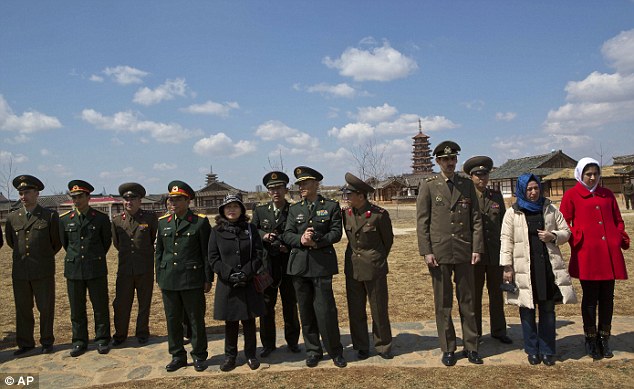 Still finding time to relax: North Korean military, along with foreign military attaches from Russia, China, and Iran watch a dance performance as they visit the Pyongyang Folk Park on the outskirts of the capital
Still finding time to relax: North Korean military, along with foreign military attaches from Russia, China, and Iran watch a dance performance as they visit the Pyongyang Folk Park on the outskirts of the capital
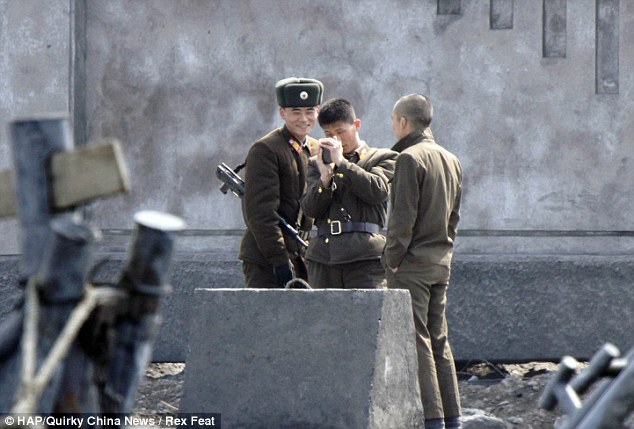 Chilling out: North Korean soldiers can afford a laugh despite the escalating missile crisis
Chilling out: North Korean soldiers can afford a laugh despite the escalating missile crisis
North Korea’s missile, dubbed the Musudan after the name of the village where North Korea has a launch pad, could reach the U.S. territory of Guam and US military installations in Japan.
Foreign minister Yun Byung-se said South Korea had asked China and Russia to intercede with the North to ease tension that has mounted since the UN Security Council slapped fresh sanctions on Pyongyang after a nuclear arms test in February.
A test-fire of the Musudan missile would violate UN resolutions banning North Korea from nuclear and missile activity, and escalate tensions with the US, South Korea and Japan.
Mr Yun said: ‘According to intelligence obtained by our side and the US, the possibility of a missile launch by North Korea is very high.’
US Defence Secretary Chuck Hagel said North Korea was skating close to a ‘dangerous line’, while Japan’s defence minister Itsunori Onodera said his nation was on ‘high alert’.
North Korean officials have not announced plans to launch a missile, but have urged tourists in South Korea to take cover, warning that a nuclear war is imminent. However, most diplomats and foreign residents have dismissed this.
There were also reports that North Korea’s army is split over leader Kim Jong-un’s threats to wage an all-out war with the West.
The madman dictator is said to be facing an insurgency from within his own military despite threatening to launch missiles that could reach Japan.
As the peninsula edges ever closer to war, there were reports that the military is split over the young dictator’s aggression, which may stem from a desire to rein in his discontented but powerful generals.
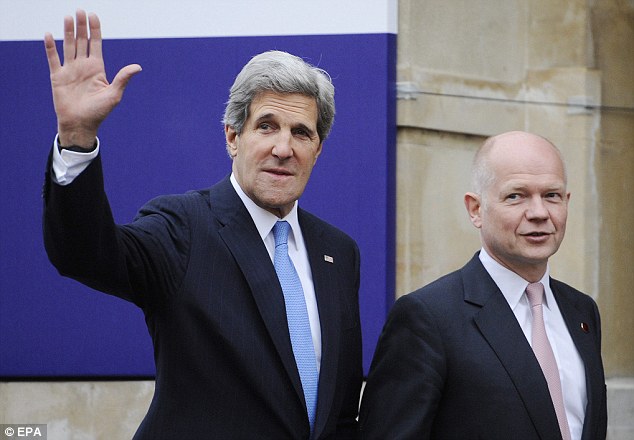 Urgent talks: British Foreign Secretary William Hague (right) walks with U.S. Secretary of State John Kerry ahead of a G8 meeting which will focus on the developing crisis in North Korea
Urgent talks: British Foreign Secretary William Hague (right) walks with U.S. Secretary of State John Kerry ahead of a G8 meeting which will focus on the developing crisis in North Korea
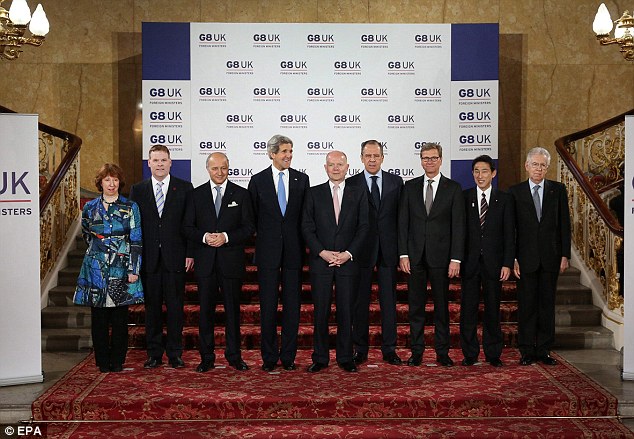 Crisis: William Hague is hosting counterparts of the G8 from the U.S., Canada, France, Germany, Italy, Japan and Russia amid fears the escalating tensions could trigger a nuclear war
Crisis: William Hague is hosting counterparts of the G8 from the U.S., Canada, France, Germany, Italy, Japan and Russia amid fears the escalating tensions could trigger a nuclear war
First Lieutenant Kim, 42, said he had been forced to flee North Korea after he murdered a rival officer as factions in his unit vied for control.
‘I killed a three-star company commander, the same rank as me,’ he said. ‘He was the head of the faction supporting Kim Jong-un. There were two fights. In the first fight, they surrounded us and arrested a lot of people.
‘But I got away and gathered others from the barracks. We found them and I shot the commander. After that, I escaped.’
The Daily Telegraph reported that the battles occurred at the end of 2011, shortly before Kim Jong-un succeeded his father as the ‘supreme commander’ of the 1.2million-strong Korean People’s Army.
He said there may have been a violent disagreement between two major departments over army reconnaissance last year, possibly alarming the 30-year-old and spurring him on to tighten his grip on power.
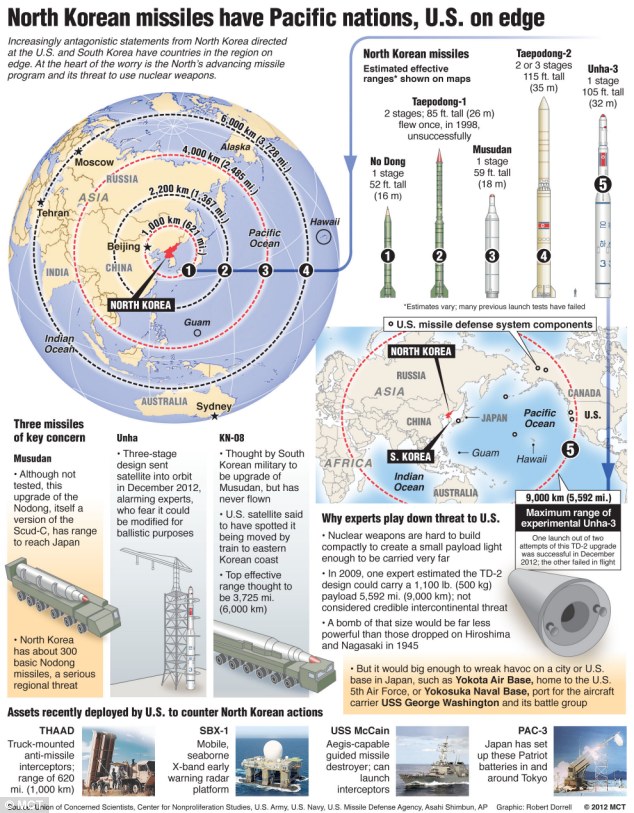 Zone of terror: Maps and diagrams detail the potential effective range and threat represented by several North Korean missile systems
Zone of terror: Maps and diagrams detail the potential effective range and threat represented by several North Korean missile systems
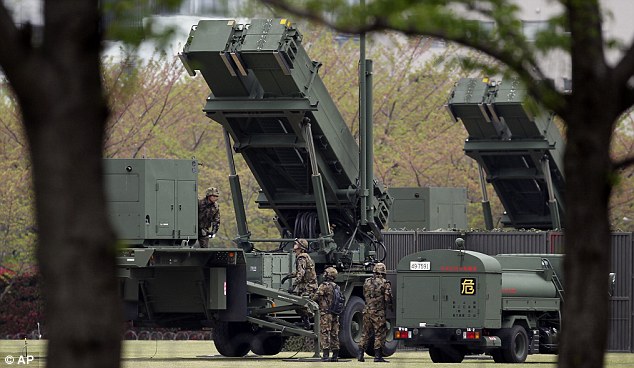 At the ready: Japanese forces set up Patriot anti-missile defence systems in Tokyo today as the threat level over a North Korea missile launch was raised to ‘vital’
At the ready: Japanese forces set up Patriot anti-missile defence systems in Tokyo today as the threat level over a North Korea missile launch was raised to ‘vital’
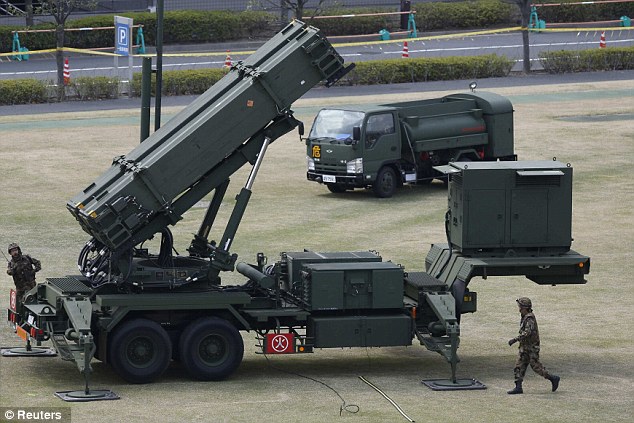
Primed: Japan mobilised its tropps as it was claimed by U.S. and South Korean sources that at least one previously untested missile with a 3,000km (2,000-mile) range is fuelled and ready for launch
This view is echoed by North Korean defector Kim Hyun-hee, who today told an Australian broadcaster: ‘Kim Jong-un is too young and too inexperienced. He’s struggling to gain complete control over the military and to win their loyalty.’
South Korea fears Pyongyang could launch up to three different types of missiles. One unnamed official told the Yonhap news agency: ‘There are clear signs that the North could simultaneously fire off Musudan, Scud and Nodong missiles.’
In rare cases, foreigners have heeded Pyongyang’s warnings and fled Seoul, despite repeated attempts by analysts to play down Pyongyang’s aggressive rhetoric.
‘One of my friends left for the airport this morning,’ said Zoe Chau, a hotel receptionist from Hong Kong told North Korea News. ‘She felt Seoul was too close to the action so bought a ticket to Jeju Island, she’s there now.’
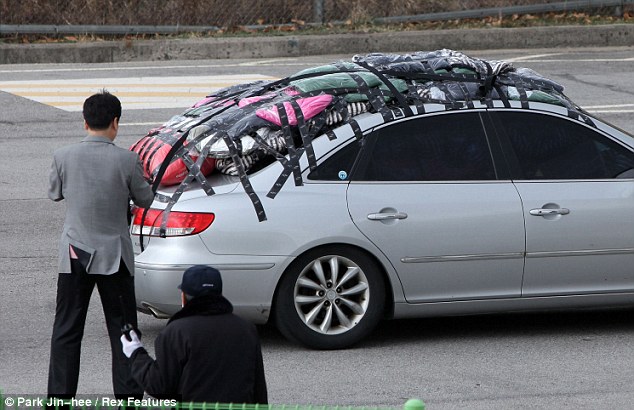 A South Korean vehicle - complete with luggage taped to the roof - and workers return from the Kaesong industrial complex, a joint business zone operated by both Koreas
A South Korean vehicle - complete with luggage taped to the roof - and workers return from the Kaesong industrial complex, a joint business zone operated by both Koreas
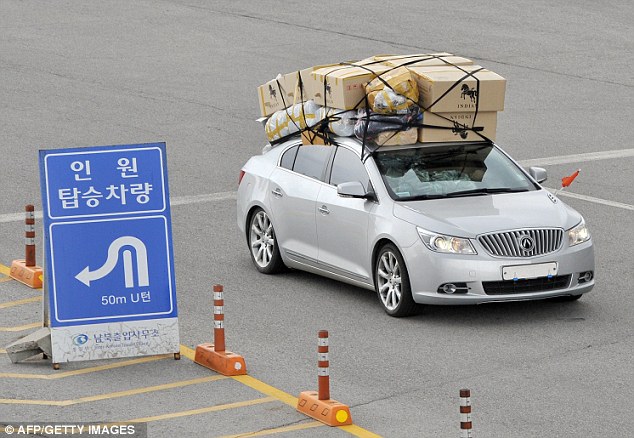 Escape: A car loaded with boxes arrives in South Korea from the Kaesong joint industrial complex
Escape: A car loaded with boxes arrives in South Korea from the Kaesong joint industrial complex
 North Koreans who fled the country say the young dictator wishes to tighten his precarious grip on power
North Koreans who fled the country say the young dictator wishes to tighten his precarious grip on power
The U.S. and South Korea believe dictator Kim Jong-un may test fire a nuclear-capable missile with a 3,000km (2,000-mile) range at any time and without issuing a standard notice to commercial aviation and maritime shipping so they can avoid the area.
South Korean Foreign Minister Yun Byung-Se told a parliamentary hearing: ‘According to intelligence obtained by our side and the U.S., the possibility of a missile launch by North Korea is very high.’
North Korea, he added, could launch a Musudan missile ‘at any time from now’.
A border crossing between North Korea and China was closed to tourist groups as the Korean peninsula edged closer to nuclear war.
The Obama administration believes North Korea will likely test one of its mobile ballistic missiles imminently after the most recent intelligence showed Pyongyang had probably completed its launch preparations.
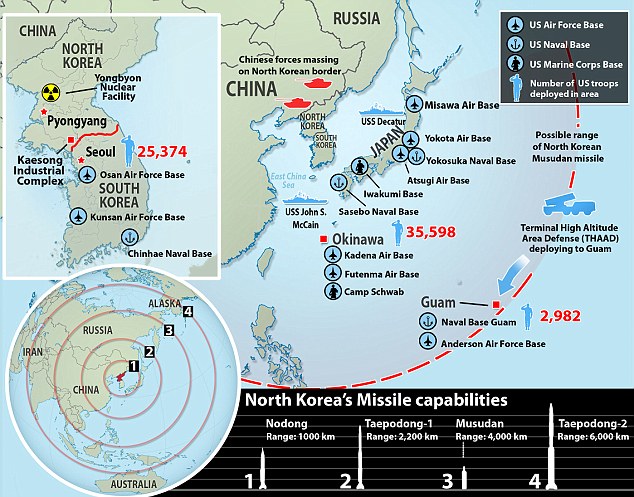
A map showing North Korea missile ranges. The Pentagon has announced it is deploying missile defense systems to the U.S. base in Guam and missile defense ships to sea between Japan and the rogue nation
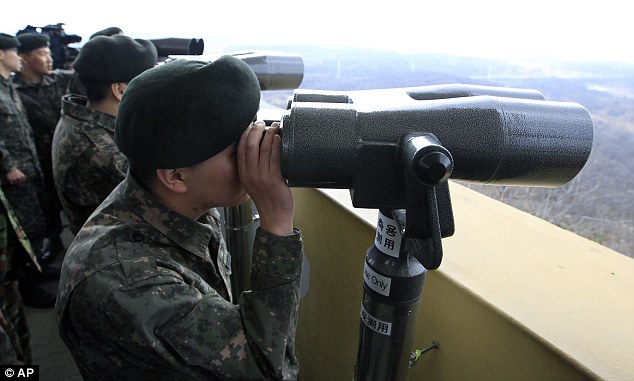 South Korean soldiers keep watch on North Korea through binoculars from an observation post near the border village of Panmunjom
South Korean soldiers keep watch on North Korea through binoculars from an observation post near the border village of Panmunjom
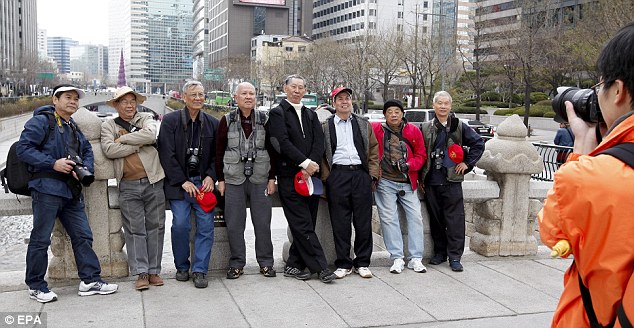 Leave, now: Foreign tourists pose for a picture in Seoul. North Korea urged foreigners in South Korea to evacuate
Leave, now: Foreign tourists pose for a picture in Seoul. North Korea urged foreigners in South Korea to evacuate
PYONGYANG MARATHON WILL GO AHEAD DESPITE WAR ON HORIZON
Having threatened to bomb the United States and warned foreigners to leave South Korea due to an impending thermonuclear war, North Korea said today it was readying for a marathon to celebrate its founder’s birthday.
The North’s state news agency said a big contingent of foreign runners was expected from countries including Ukraine, the Czech Republic, Zimbabwe, Kenya and Ethiopia as well as 600 North Koreans at the April 14 race.
‘I think enthusiasm for the upcoming tournament is running high among local marathoners and their coaches as never before,’ the KCNA news agency cited Ham Chang-hyok of the Sports Ministry as saying.
This is the 26th time the Mangyongdae Prize International Marathon has been held.
But a U.S. official said there was no guarantee North Korea would give any warning of its launch to civilians.
‘We hope they issue a notification, but at this point we don’t expect it. We are working on the assumption they won’t,’ the unnamed official told CNN.
In anticipation, the South Korea-U.S. Combined Forces have raised their alert level to Watchcon 2 - a vital threat - to increase surveillance monitoring, Yonhap news agency quoted a senior military official as saying.
Watchcon 4 is in effect during normal peacetime, while Watchcon 3 reflects indications of an important threat. Watchcon 1 is used in wartime.
U.S. defenses could intercept a ballistic missile launched by North Korea if it decides to strike, said Admiral Samuel Locklear, the top American military commander in the Pacific.
Locklear told the Senate Armed Services Committee that he was confident that the U.S. military can thwart North Korea if it chooses to act.
Foreign minister Yun said he was coordinating with China and Russia ‘to make efforts to persuade North Korea to change its attitude’.
China is North Korea’s sole major ally, although its influence over Pyongyang is open to question and Beijing has, in any event, backed the new sanctions.
Moscow backed North Korea in Soviet times, though its influence has waned unquestionably.
A Chinese Foreign Ministry spokesman issued a fresh appeal for restraint on the Korean peninsula and said nothing about any possible effort to bring about a change in the North’s policy.
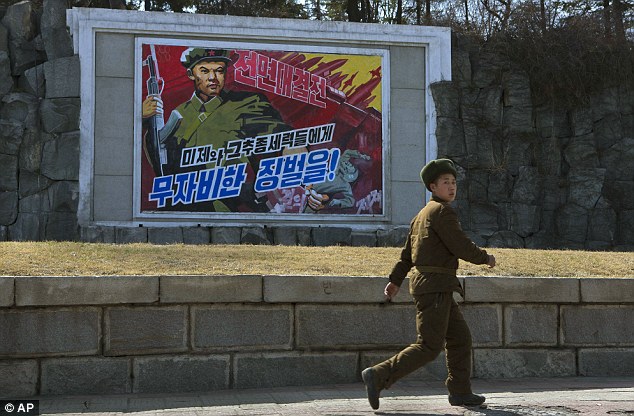 A North Korean man passes by roadside propaganda depicting a soldier killing a U.S. soldier in Pyongyang, North Korea today. The poster reads in Korean ‘Life or Death Battle. Merciless Punishment to U.S. Imperialists and Puppet Traitors’
A North Korean man passes by roadside propaganda depicting a soldier killing a U.S. soldier in Pyongyang, North Korea today. The poster reads in Korean ‘Life or Death Battle. Merciless Punishment to U.S. Imperialists and Puppet Traitors’
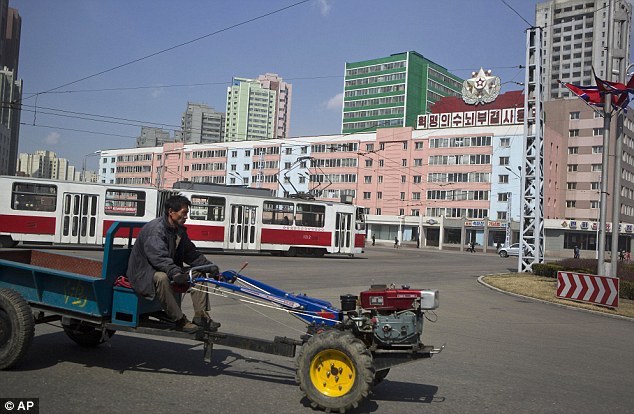 Business as usual: A North Korean man drives a small tractor in central Pyongyang
Business as usual: A North Korean man drives a small tractor in central Pyongyang
Patricia Lewis, Research Director at the London-based think tank Chatham House, said that strictly on the basis of the North’s vast conventional forces, caution was required.
‘The conventional military capabilities of North Korea are all too real and all too close to Seoul,’ she wrote in a paper. ‘Any incursion could escalate involving the U.S. and Japan, China, perhaps Russia and others.’
Pyongyang has tested short-range Scud missiles. The longer-range Musudan and Nodong missiles are an unknown quantity.
UN Secretary General Ban Ki-moon said during a visit to Rome that he had spoken to the Chinese leadership to try to calm tensions, and would discuss the issue with US President Barack Obama tomorrow.
‘The current level of tension is very dangerous, a small incident caused by miscalculation or misjudgement may create an uncontrollable situation,’ Ban said.
Yesterday, North Korea warned all foreigners to evacuate South Korea yesterday because the two countries are on the verge of a nuclear war - as Japan set up a huge new anti-missile system in Tokyo.
In a further sign of rising nuclear tensions, a key border crossing between North Korea and China has been closed to tourist groups, a Chinese official said Wednesday.
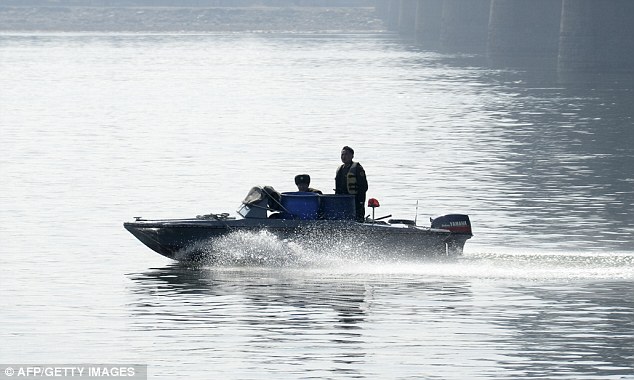 Keeping watch: A North Korean patrol boat cruises the Yalu River after a key border crossing between North Korea and China was closed to tourist groups as nuclear tensions mounted
Keeping watch: A North Korean patrol boat cruises the Yalu River after a key border crossing between North Korea and China was closed to tourist groups as nuclear tensions mounted
An official at the Dandong Border Office, who declined to give his name, told AFP: ‘Travel agencies are not allowed to take tourist groups to go there, since the North Korean government is now asking foreign people to leave. As far as I know, business people can enter and leave North Korea freely.’
A woman surnamed Wu at a travel agency in the town said municipal authorities told it not to take tours into North Korea.
‘It was absolutely North Korea’s (decision) because the travel bureau told us “North Korea is now no longer allowing tour groups to be taken in”,’ the woman told 9 News World.
‘WE’RE STILL GOING’: TOUR OPERATORS SAY TRIPS TO PARIAH STATE WILL GO AHEAD
Western tour operators ‘Koryo Tours’ and ‘Young Pioneer Tours’ both said today that there were no plans to cancel any of their forthcoming tours, making it unclear if the suspension applied to everyone.
‘We have a group in the county at the moment led by Dan, one of our guides, and he phoned in today on his mobile saying everything is as normal as it ever is,’ Nick Bonner of Koryo Tours wrote on the tour group’s Facebook page.
Meanwhile the United Kingdom’s Foreign and Commonwealth Office continues to say that travel to North Korea remains unaffected by the latest tensions.
It said: ‘Our overall assessment is that there is currently no immediate increased risk or danger to those living in or travelling to the DPRK as a result of these statements.’
Dandong-based Explore North Korea published a notification last night telling customers that all tours to the DPRK would be cancelled until further notice.
Following a nearly two hour long meeting with North Korean tour officials, the Chinese company, which normally brings western visitors to North Korea, posted an advisory adding that tours would only be resumed once official confirmation was provided by North Korea, reports NK News.
Leonid Petrov, a researcher at the Australian National University in Canberra, told NK News that the move showed a ‘logical’ and ‘consistent’ approach to escalating a feeling of crisis on the peninsula.
He said: ‘War zones are incompatible with joint industrial parks, travel groups or even with foreign embassies. Pyongyang wants to convince the world that Korea will soon be engulfed in the flames of nuclear inferno.
‘The scary truth is that this can really happen regardless of who makes the first shot. ‘China is North Korea’s sole major ally and the provider of the vast majority of its trade and aid, with most of the business passing through Dandong.’
The rising tensions come just days before the April 15 birthday of North Korea’s founder, historically a time when it seeks to draw the world’s attention with dramatic displays of military power.
In Pyongyang, however, the focus today was less on preparing for war and more on beautifying the city ahead of the nation’s biggest holiday.
Soldiers hammered away on construction projects, gardeners got down on their knees to plant flowers and trees, and students marched off to school, belying a sense that tensions on the Korean Peninsula have reached their highest point since the Korean War ended nearly 60 years ago.
Last year, the days surrounding the centennial of the birth of Kim Sung-il, grandfather of the current ruler, was marked by parades of tanks, goose-stepping soldiers and missiles, as well as the failed launch of a satellite-carrying rocket widely believed by the U.S. and its allies in the West to be a test of ballistic missile capabilities.
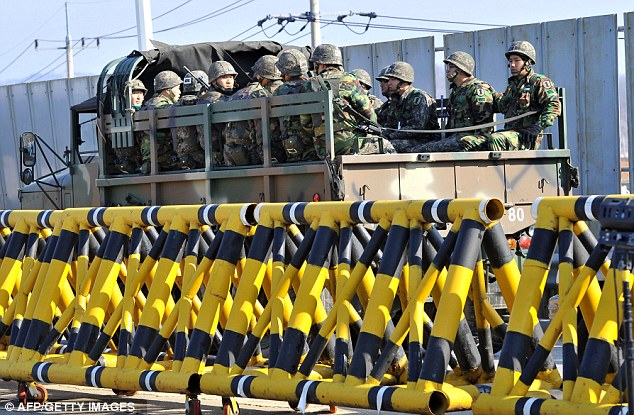 Mobilising: South Korean soldiers ride a military truck on the road leading to North Korea at a military checkpoint in the border city of Paju
Mobilising: South Korean soldiers ride a military truck on the road leading to North Korea at a military checkpoint in the border city of Paju
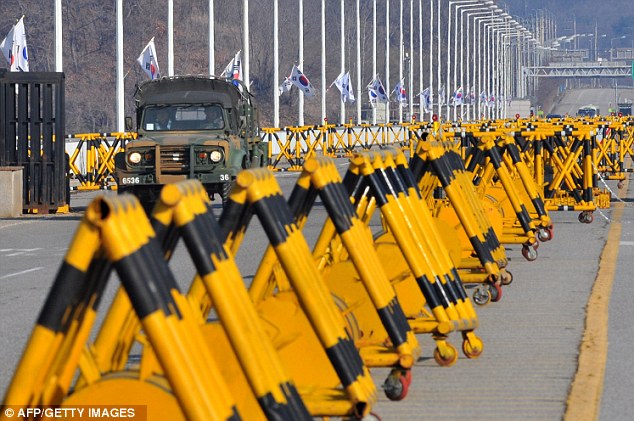 Threat level raised: A South Korean military vehicle drives past barricades on the road leading to North Korea, which is expecting to launch a missile ‘at any time’
Threat level raised: A South Korean military vehicle drives past barricades on the road leading to North Korea, which is expecting to launch a missile ‘at any time’
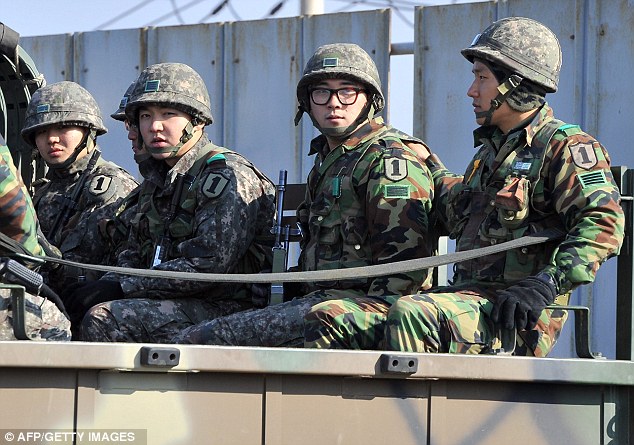 On standby: South Korean soldiers ride a military truck on the road leading to North Korea as the co-ordinated military surveillance status was upgraded
On standby: South Korean soldiers ride a military truck on the road leading to North Korea as the co-ordinated military surveillance status was upgraded
A subsequent test in December went off successfully, and that was followed by the country’s third underground nuclear test on Feb. 12 this year, a step toward mastering the technology for mounting an atomic bomb on a missile.
The resulting U.N. sanctions have been met with an unending string of threats and provocations from the North, raising tensions on the peninsula to their highest point since the end of the Korean War in 1953, according to some experts.
The moves are seen as an attempt by North Korea to scare foreigners into pressing their governments to pressure Washington and Seoul to avert a conflict, and boost the militaristic credentials of its young and relatively untested leader, Kim Jong-un.
NORTH KOREA CYBER ATTACK ‘SHUT DOWN 32,000 COMPUTERS IN THE SOUTH’
North Korean government agents were behind a March cyber attack that shut down about 32,000 computers and servers at South Korean broadcasters and banks, an investigation has found.
An official at South Korea’s internet security agency, Chun Kil-soo, told reporters Wednesday that the attack was similar to past North Korean hacking. He said investigators believe that six computers in North Korea were used to access South Korean servers using more than 1,000 IP addresses overseas.
The accusation comes as tensions run high on the Korean Peninsula, with North Korea delivering increasingly belligerent rhetoric in anger over UN sanctions and US-South Korean military drills.
On Tuesday, the North said a nuclear war is imminent and recommended that foreigners in South Korea evacuate to safe places.
Pyongyang advised foreign embassies to consider evacuating their citizens by Wednesday, and warned tourists in South Korea to leave Seoul in case of an outbreak of war.
However, most diplomats and foreign residents appeared to be staying put.
In Seoul, the defense ministry official said the North appeared prepared to carry out a missile launch at any time. He spoke on condition of anonymity, saying he wasn’t authorized to speak to the media.
He said Pyongyang’s military is capable of conducting multiple missile launches involving Scud and medium-range Rodong missiles, as well as a missile transported to the east coast recently. He refused to say how Seoul obtained the information.
Admiral Samuel Locklear, commander of U.S. Pacific Command, told the Senate Armed Services Committee in Washington yesterday that he concurred with an assessment by Senator John McCain, R-Ariz., calling the tension between North Korea and the West the worst since the end of the Korean War.
‘The continued advancement of the North’s nuclear and missile programs, its conventional force posture, and its willingness to resort to asymmetric actions as a tool of coercive diplomacy creates an environment marked by the potential for miscalculation,’ Locklear told the panel.
He said the U.S. military and its allies would be ready if North Korea tries to strike.
Despite such tidings of war, the people of Pyongyang went about their daily lives.
Associated Press journalists in the North Korean capital saw soldiers wearing hard hats rumbling past in the back of a truck as they prepared for another day’s work doing construction.
In recent years, military personnel have been pressed into helping build the many urban renewal projects that have been prioritised since Kim Jong-un came to power in December 2011.
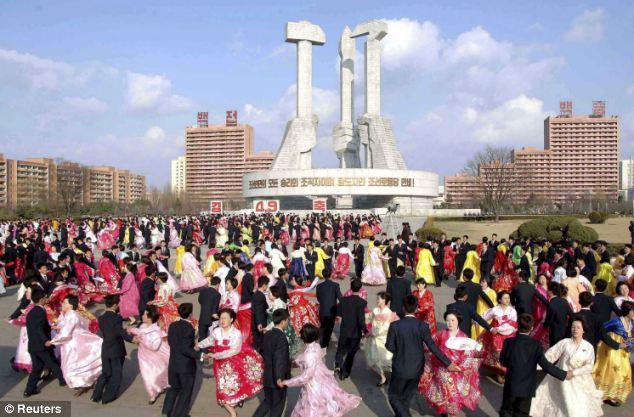 Thousands of North Koreans dance in Pyongyang in celebration of their former leader Kim Jong-Il
Thousands of North Koreans dance in Pyongyang in celebration of their former leader Kim Jong-Il
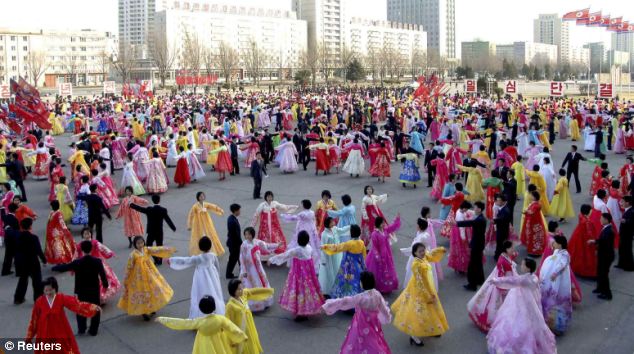 Event came as Pyongyang warned foreigners to leave the South, saying two Koreas are on verge of civil war
Event came as Pyongyang warned foreigners to leave the South, saying two Koreas are on verge of civil war
In a sign they have been diverted away from preparing for conventional warfare, they are commonly referred to as ‘soldier-builders’ and are also called upon to help plant and harvest rice and other crops in a nation that suffers chronically from food shortages.
North Korea sporadically holds civil air raid drills during which citizens practice blacking out their windows and seeking shelter. But no such drills have been held in recent months, local residents said.
‘I’m not at all worried. We have confidence in our young marshal’ Kim Jong-un, a cleaning lady at the Koryo Hotel said as she made up a guest’s bed. ‘The rest of the world can just squawk all they want but we have confidence in his leadership.
‘We are resolved to stay and defend him until the end,’ she said. ‘It may be hard for the rest of the world to understand, and those who are worried are welcome to leave,’ she said in the typical nationalistic style that North Koreans use while talking to foreigners.
But there was no sign of an exodus of foreigners from Seoul or Pyongyang.
Britain and other governments with embassies in Pyongyang said they had no immediate plans to withdraw but would continue assessing the situation.
North Korea has been escalating tensions with the U.S. and South Korea, its wartime foes, for months.
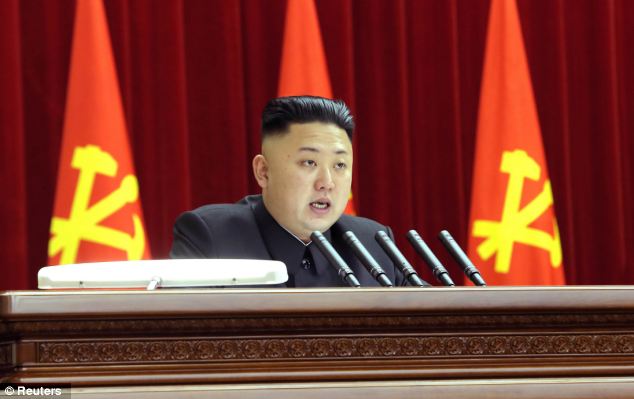
North Korea has warned all foreigners to leave South Korea as Kim Jong-un’s government continues to increase tensions on the Korean Peninsula
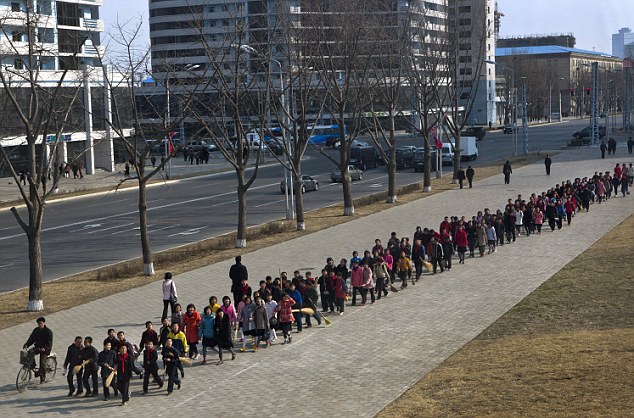 North Korean children carrying brooms help tidy up the area around bronze statues of the late leaders
North Korean children carrying brooms help tidy up the area around bronze statues of the late leaders
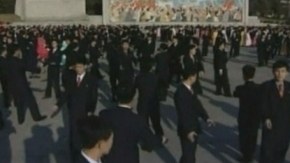
The tightened U.N. sanctions that followed the nuclear test drew the ire of North Korea, which accused Washington and Seoul of leading the campaign against it.
Annual U.S.-South Korean military drills south of the border have further incensed Pyongyang, which sees them as practice for an invasion.
Last week, Kim Jong-un enshrined the pursuit of nuclear weapons - which the North characterizes as a defense against the U.S. - as a national goal, along with improving the economy. North Korea also declared it would restart a mothballed nuclear complex.
NORTH KOREA’S MISSILE THREAT
The Musudan, also known as the Nodong-B or the Taepodong-X, is an intermediate-range ballistic missile. It has a range of 3,000 kilometres (1,800 miles) - that would make Japan and South Korea potential targets, but little is known about the missile’s accuracy.
The KN-08 is an 18-metre long missile that North Korea claims has a range of 10,000 miles, putting the U.S. in range, but military experts believe 6,000 miles is more realistic.
It is a concern as it is road-mobile and easy to hide.
North Korea isn’t thought to have nuclear-armed missiles that can hit the United States and, despite threats, is extremely unlikely to launch a direct attack on Seoul or its U.S. ally, knowing that military retaliation would threaten the leadership’s survival.
This week the Pentagon deployed two Aegis-equipped missile defense ships to operate off the Korean peninsula.
Citing the tensions with Seoul, North Korea on Monday pulled more than 50,000 workers from the Kaesong industrial park, which combines South Korean technology and know-how with cheap North Korean labor.
It was the first time that production was stopped at the decade-old factory park, the only remaining symbol of economic co-operation between the Koreas.
Pyongyang also has moved to its eastern seaboard what is believed by U.S. and South Korean intelligence to be a mid-range missile capable of hitting targets in Japan, such as the U.S. military installations on that country’s main island.
Another possibility is that Pyongyang would launch such a missile into the sea as a display of its military prowess.
The United States and South Korea have raised their defense postures, as has Japan, which deployed PAC-3 missile interceptors in key locations around Tokyo. And Locklear said the U.S. military would be ready to strike back if provoked.
One historian, James Person, noted that it isn’t the first time North Korea has warned foreign embassies to prepare for a U.S. attack.
He said that in 1968, following North Korea’s seizure of an American ship, the USS Pueblo, Pyongyang persistently advised foreign diplomats to prepare for a U.S. counterattack.
Cables from the Romanian mission in Pyongyang showed embassies were instructed to build anti-air bunkers ‘to protect foreigners against air attacks,’ he said.
The cables were obtained and posted online by the Wilson Center’s North Korea International Documentation Project.
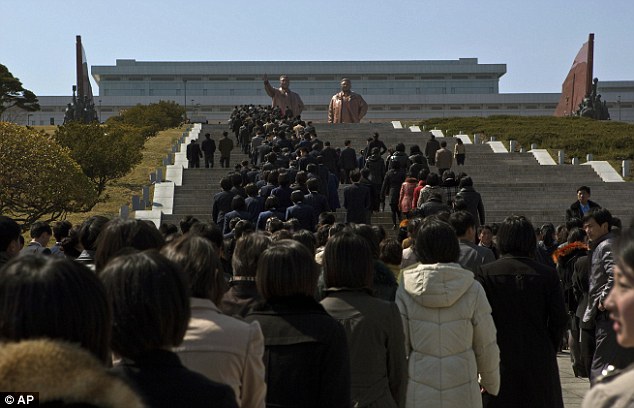 Young North Korean workers and students climb stairs to the base of bronze statues of the late leaders Kim Il Sung and Kim Jong Il during an event to pledge loyalty to the country in Pyongyang
Young North Korean workers and students climb stairs to the base of bronze statues of the late leaders Kim Il Sung and Kim Jong Il during an event to pledge loyalty to the country in Pyongyang
Person called it one of North Korea’s first forays into what he dubs ‘military adventurism.’
‘In 1968, there was some concern there would be an attack, but (the North Koreans) certainly were building it up to be more than it was in hopes of getting more assistance from their allies at the time,’ Person said by phone from Alexandria, Virginia.
‘I think much of it was hot air then. Today, I think again it’s more hot air,’ he said. ‘The idea is to scare people into pressuring the United States to return to negotiations with North Korea. That’s the bottom line.’
South Korean President Park Geun-hye, who has sought to re-engage North Korea with dialogue and humanitarian aid since taking office in February, expressed exasperation yesterday with what she called the ‘endless vicious cycle’ of Seoul answering Pyongyang’s hostile behavior with compromise, only to get more hostility.

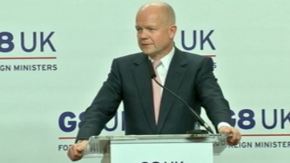

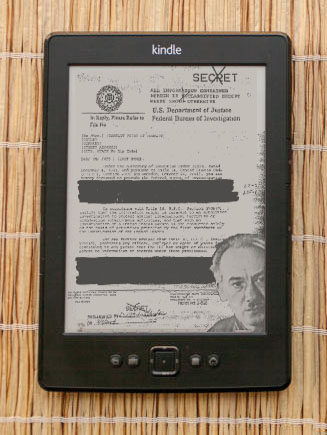
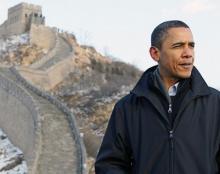


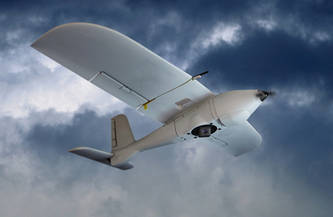 to assess the extent to which SUAS can enhance situational awareness in support of first responder and border security events,” the test plan says, noting that “such events include, but are not limited to, law enforcement response, fire response, search and rescue, response to hazardous material (HAZMAT) spills or incidents and response to intrusions at US international borders.” In addition, “Where feasible and applicable, our testing will verify SUAS performance characteristics that may impact their eventual integration into the National Air Space System.”
to assess the extent to which SUAS can enhance situational awareness in support of first responder and border security events,” the test plan says, noting that “such events include, but are not limited to, law enforcement response, fire response, search and rescue, response to hazardous material (HAZMAT) spills or incidents and response to intrusions at US international borders.” In addition, “Where feasible and applicable, our testing will verify SUAS performance characteristics that may impact their eventual integration into the National Air Space System.”
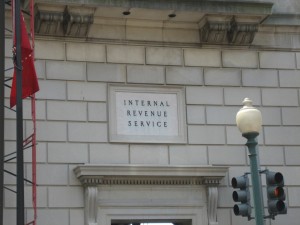
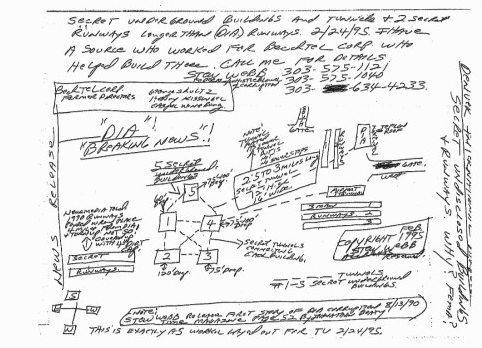
 New money: More than a dozen states have pushed laws through so that gold and silver can be used as legal tender
New money: More than a dozen states have pushed laws through so that gold and silver can be used as legal tender
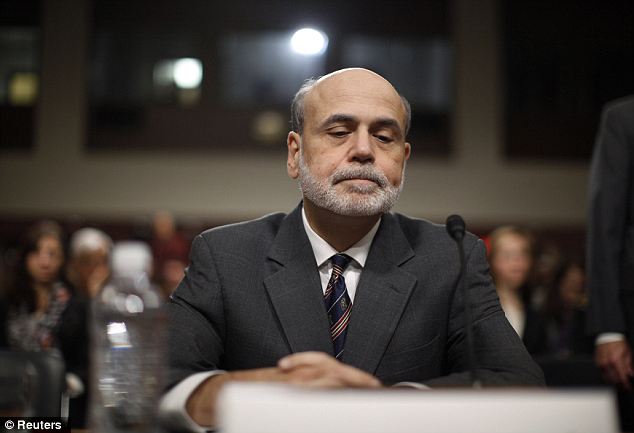 Loss of faith: Conservative politicians are concerned about the economic policies put into place by Ben Bernanke during his time as the chairman of the federal reserve
Loss of faith: Conservative politicians are concerned about the economic policies put into place by Ben Bernanke during his time as the chairman of the federal reserve
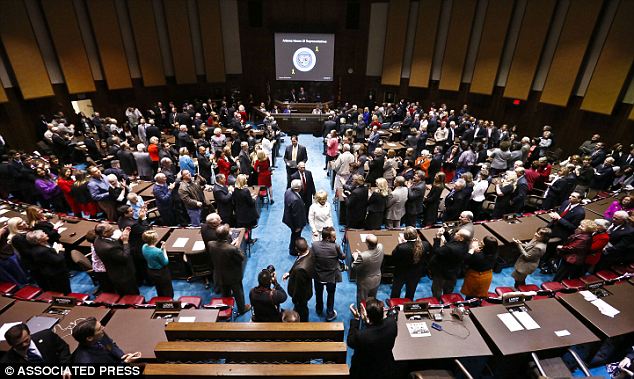 Angry Arizonans: The Arizona House of Representatives passed the law through and now it continues through the process before it goes ahead an is enacted in the state
Angry Arizonans: The Arizona House of Representatives passed the law through and now it continues through the process before it goes ahead an is enacted in the state
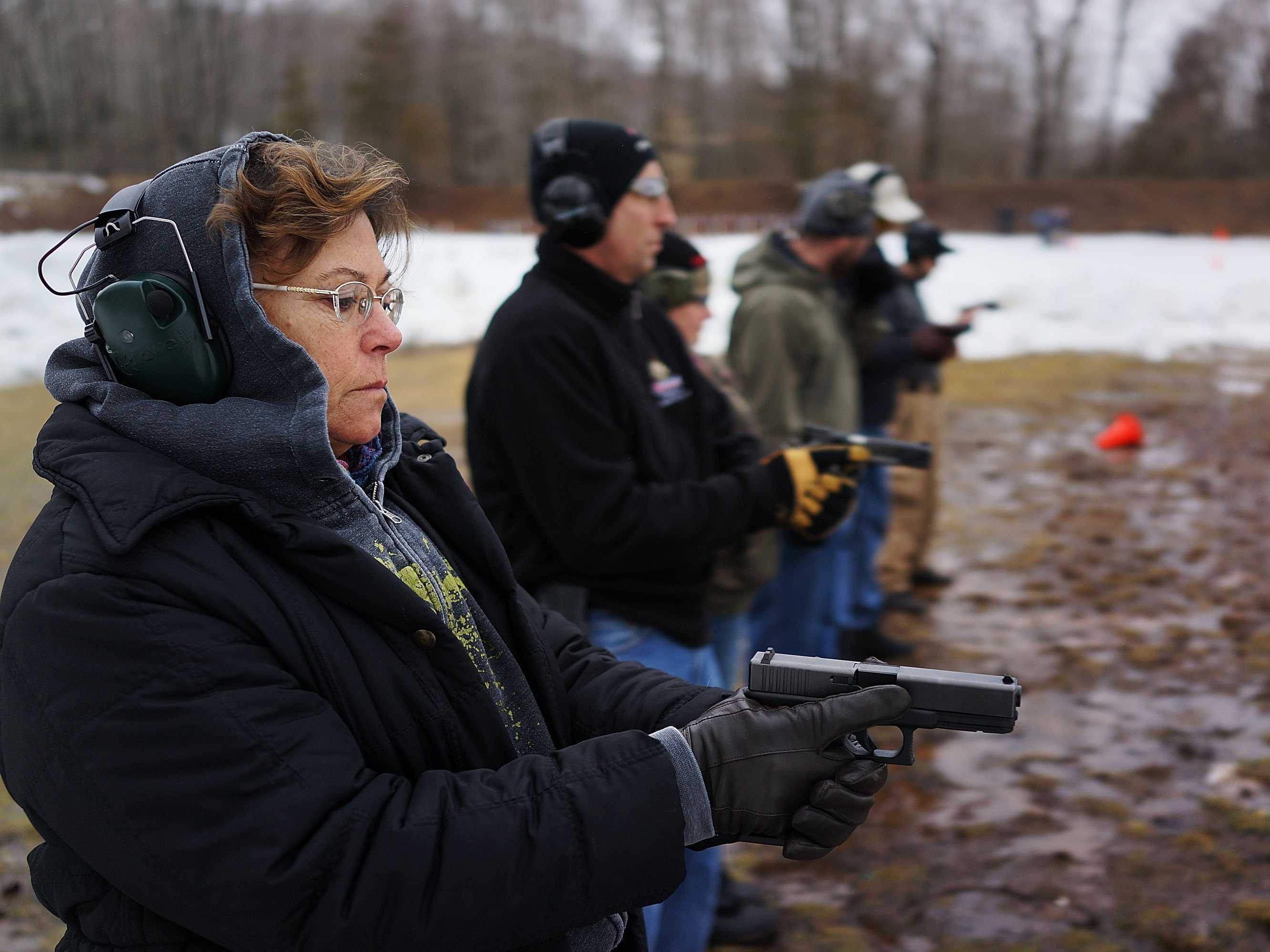
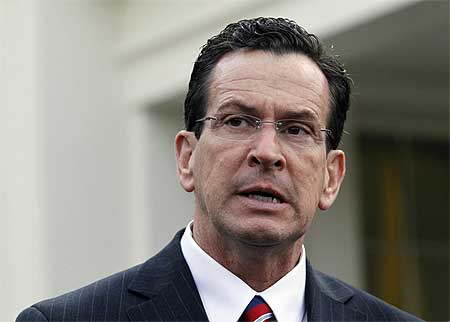

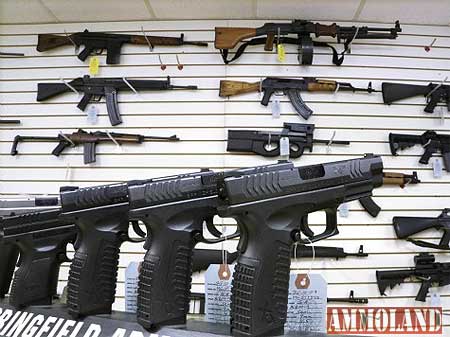


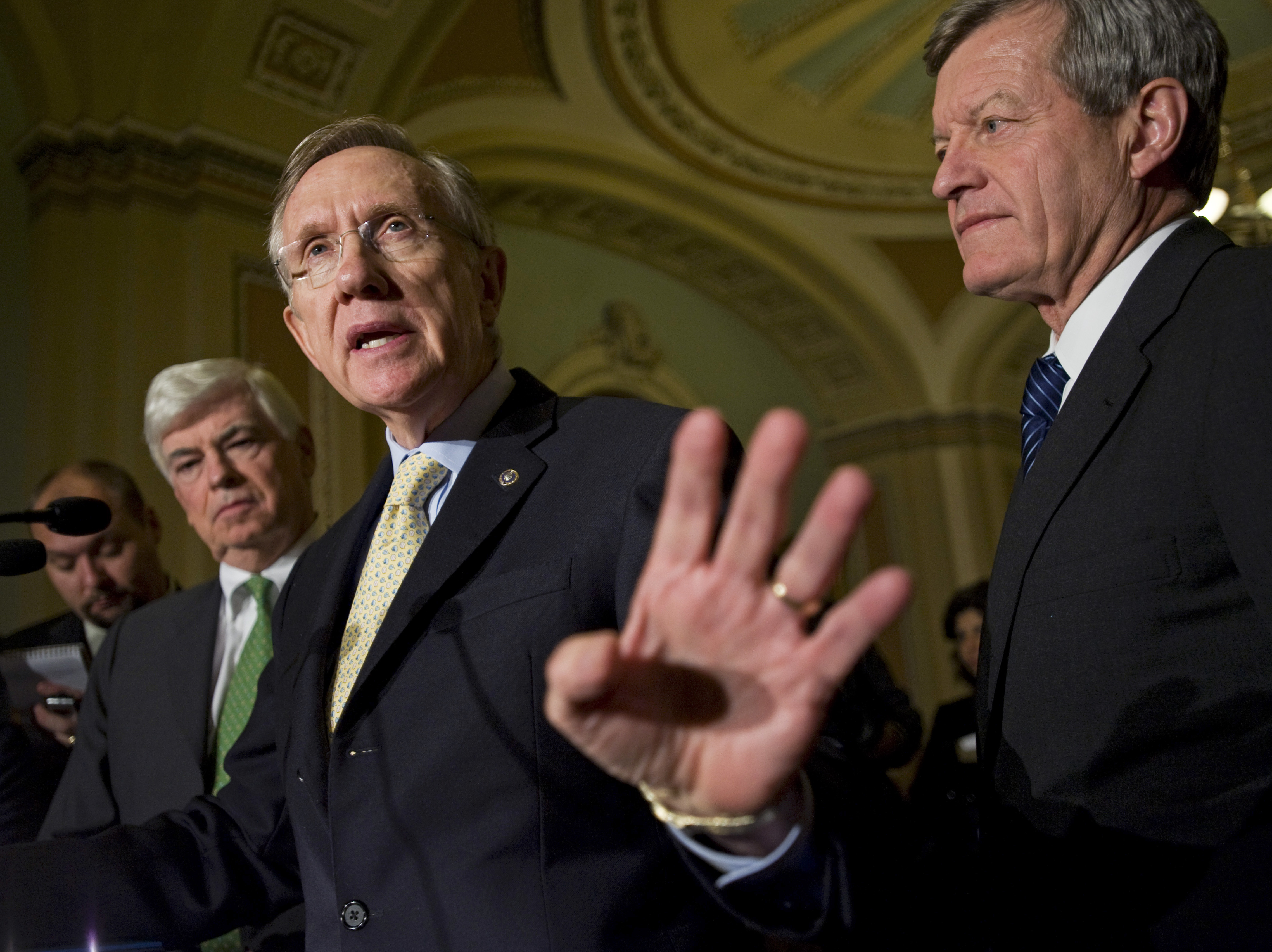




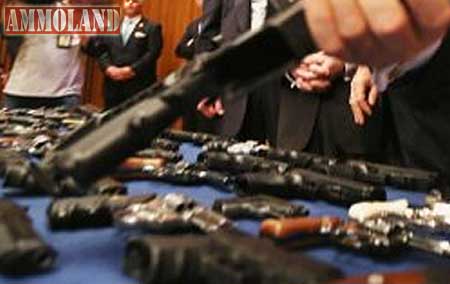


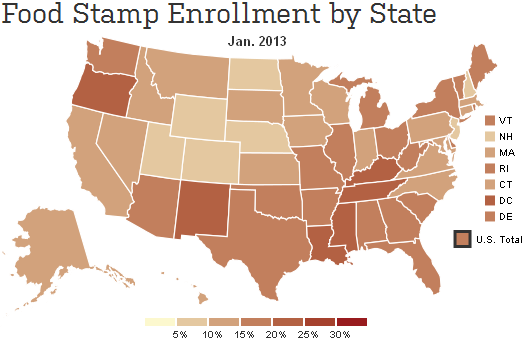
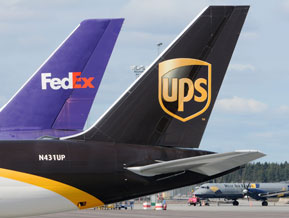
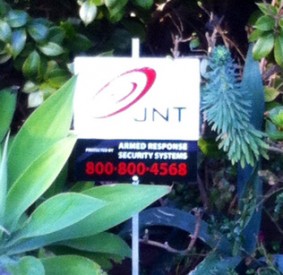
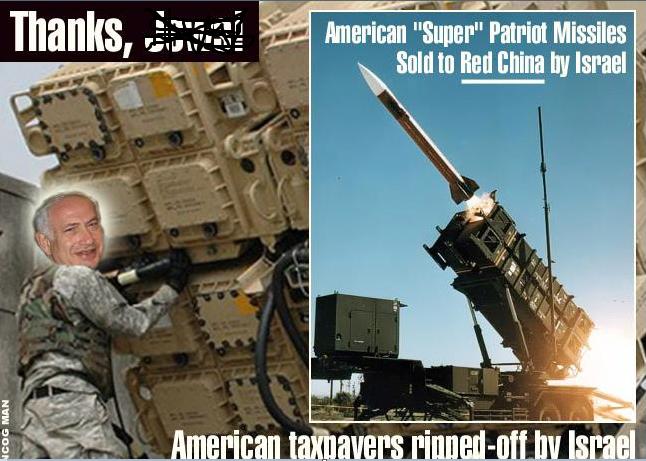
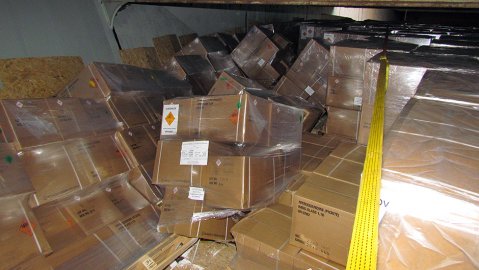
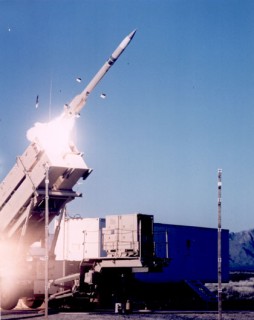
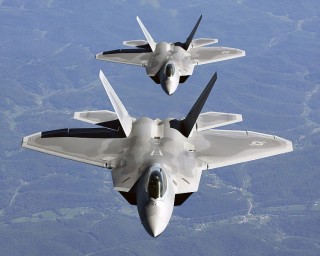
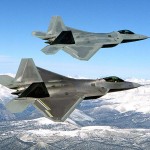
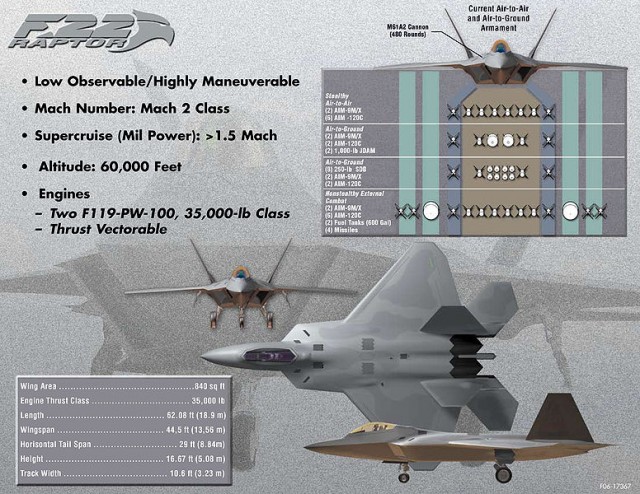
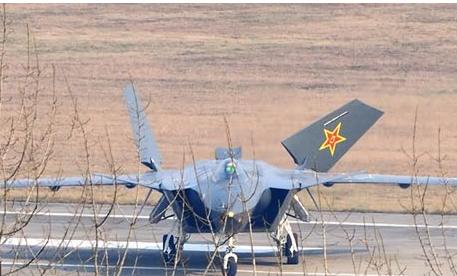


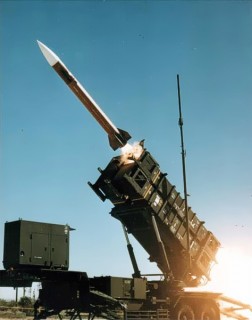
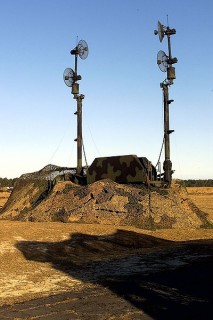

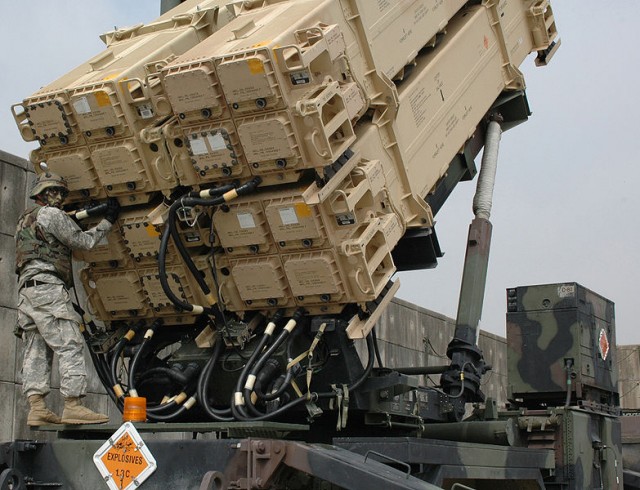

 Join Our Daily Newsletter
Join Our Daily Newsletter 


 Household rubbish that has been sorted by families for recycling is being dumped in landfill sites across the world
Household rubbish that has been sorted by families for recycling is being dumped in landfill sites across the world
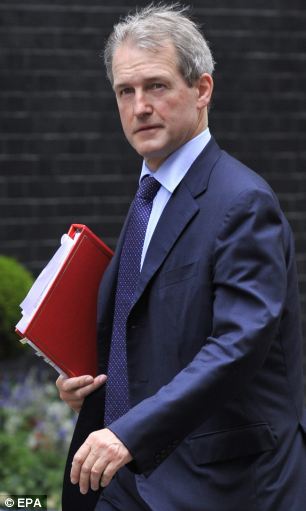 Environment secretary Owen Paterson said that Defra plans to tighten inspections at ports to curb the illegal trade of green waste
Environment secretary Owen Paterson said that Defra plans to tighten inspections at ports to curb the illegal trade of green waste
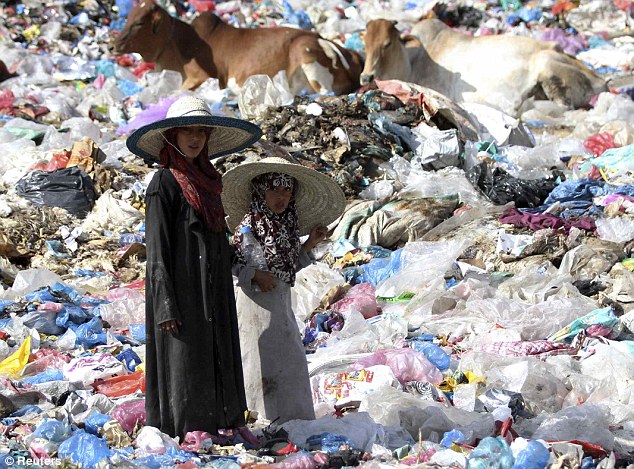 Among the rubbish that is dumped abroad used tyres are sent to China and discarded TVs and computers go to West China
Among the rubbish that is dumped abroad used tyres are sent to China and discarded TVs and computers go to West China


